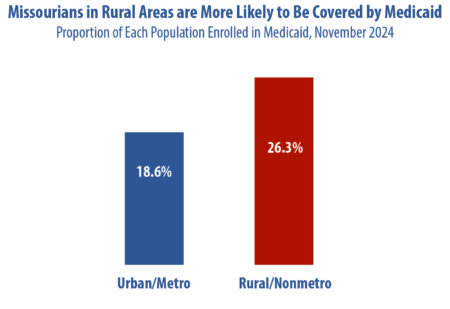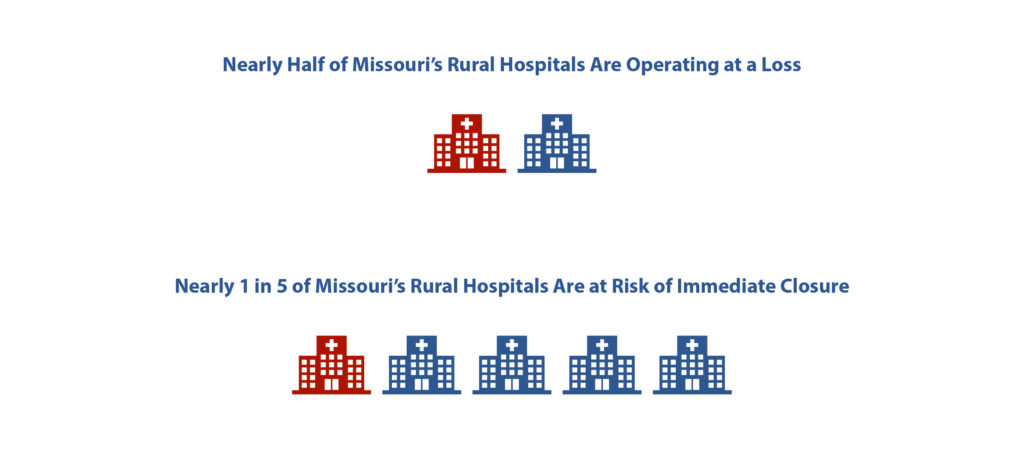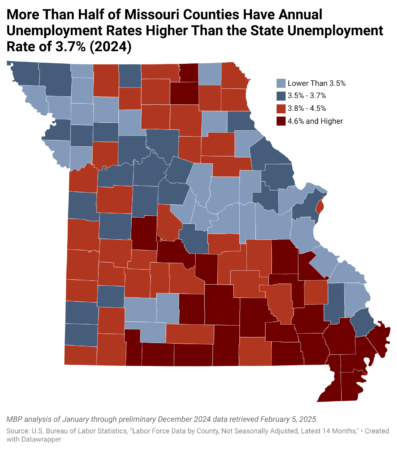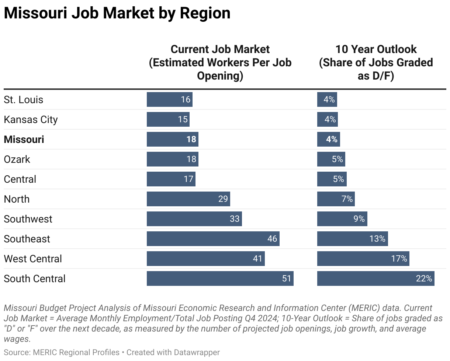Medicaid plays a critical role in rural Missouri by keeping rural health care providers afloat and by delivering health care in areas with less access to private health coverage through an employer. More than one in four Missourians living in rural areas rely on Medicaid.
But coverage for many rural Missourians is at risk as Congress is considering severe cuts to Medicaid including the implementation of work requirements. States that have implemented these requirements previously demonstrate that work requirements simply add bureaucratic red tape for both enrollees and states, causing drastic losses in health coverage – even for those who have met requirements or should be exempt.
Moreover, the requirements pose particular challenges in rural areas, straining the rural health care infrastructure even further.

Rural Residents Face Unique Challenges in Meeting Work Requirements
Approximately 90 percent of all working age adults enrolled in Medicaid are already working or may qualify for an exemption due to a disability, caregiving, or enrollment as a student. Evidence from states that have implemented work requirements indicates that even enrollees who work or are otherwise complying with reporting rules are at risk of losing coverage given complex requirements, insufficient communication, and other bureaucratic red tape.
Furthermore, many enrollees live in areas with few job prospects leaving them unable to comply. Rural communities tend to have fewer available jobs than urban areas, and the jobs that are available may be seasonal. Many rural Missourians work 60 hours per week for only half of the year, because they work during the peak agricultural times, planting and harvest critical crops to Missouri, like soybeans and corn.
Rigid work requirements that demand Medicaid enrollees report work on a monthly basis don’t account for the varied nature of work in rural Missouri. In fact, states that implemented work requirements previously found that the requirements did not increase employment but simply increased the rate of uninsured adults.
Barriers to Employment
Unemployment rates in much of rural Missouri are higher than the state average, particularly in south central and southeast Missouri. In part, this is because rural residents face an especially tight job market. In the last quarter of 2024, there were over 50 workers for each job posting in South Central Missouri compared to a statewide average of only 18 workers for each posting.
Moreover, the jobs outlook over the next decade is especially poor in many areas of rural Missouri. The Missouri Career Grades Report assigns letter
grades to various occupations within the state based on each occupation’s outlook over the next decade measured by total job openings, job growth,
and wages. In South Central Missouri, nearly 1 in 4 jobs have a “career grade” of D or F over the next decade.
In addition to the lack of available jobs, residents in rural areas often lack access to affordable childcare and must navigate a deteriorating and fragmented transportation infrastructure – compounded by having to travel further to find employment than urban residents.
Many rural residents also face specific employment challenges related to higher rates of illness and disability which impacts their ability to maintain steady employment directly, but also means rural residents are more likely to be caregivers.
Limited Access to Broadband Internet
The “reporting” component of the requirement typically involves beneficiaries inputting information about their work hours or exemptions into an online portal. But reliable internet access is a major problem for many rural residents, with nearly half of rural Missourians reporting no access to high speed internet at home, compared to fewer than 1/3 of Missourians statewide and only around 1 in 4 people nationwide. States that have already implemented work requirements have noted that rural residents were particularly at risk of experiencing problems accessing these
portals.
Work Requirements Will Add to Challenges Facing Rural Providers and Patients
Large health coverage losses triggered by the implementation of work requirements or other cuts would strain Missouri’s rural healthcare infrastructure. As patients lose their health insurance but still seek services, providers absorb the costs. When some of those providers ultimately shut their doors, all rural patients lose access to them.
Hospital Closures
These pressures are particularly acute for hospitals. Small rural hospitals struggle to keep up with larger rural or urban hospitals, having to provide the same 24/7 service but with fewer patients and less revenue. Over the past several years, Medicaid expansion has strengthened the financial health of hospitals, especially in rural areas.
Since 2004, at least 12 rural hospitals in Missouri have closed their doors, with many more at risk of closure now. Work requirements, which in other states have led to large coverage losses in the Medicaid Expansion population, threaten to undermine the financial stability of rural hospitals.




